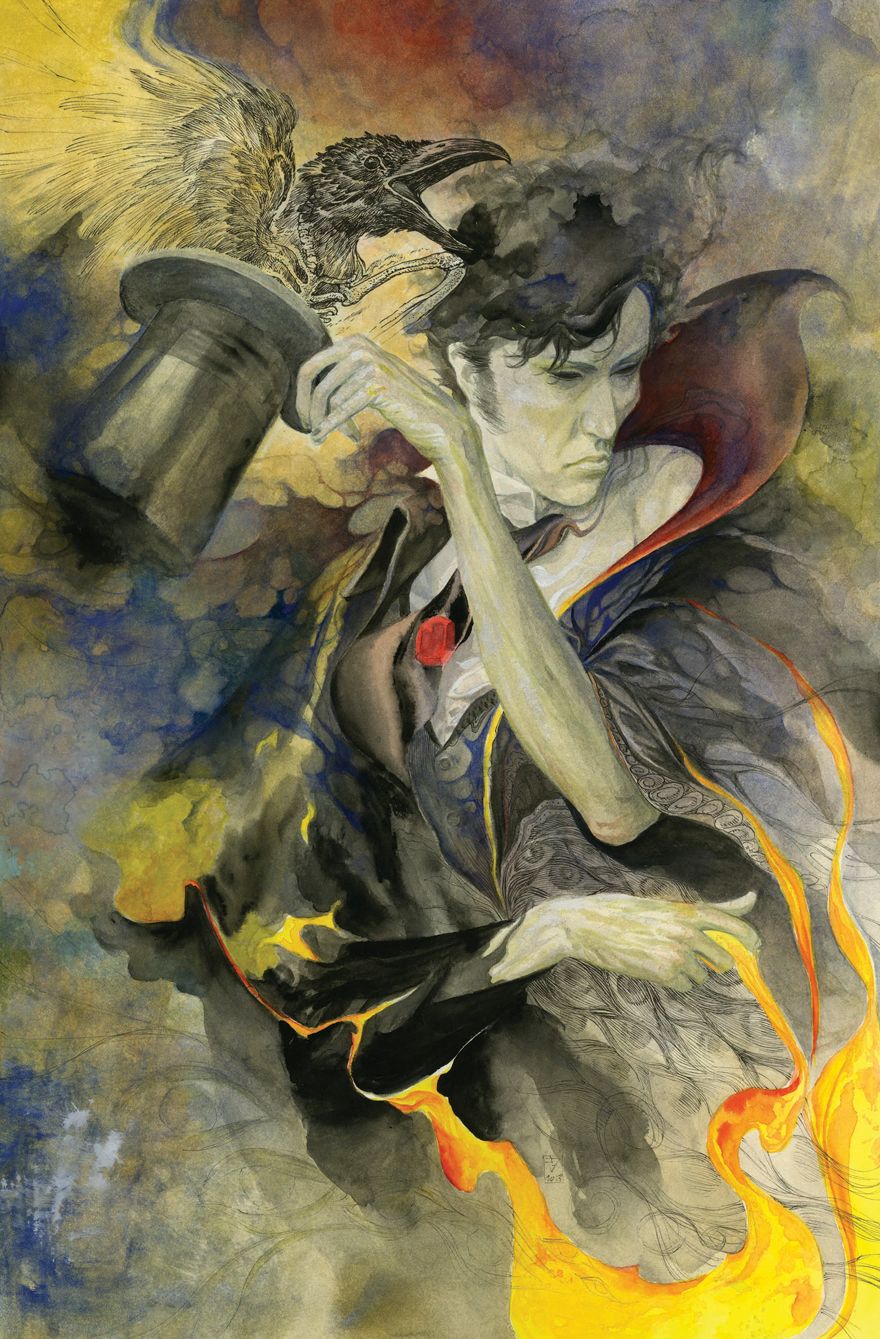After a delay of several months, "Sandman Overture" #4 by Neil Gaiman and J. H. Williams picks up where it left off, with Dream on a quest to undo an earlier mercy-fueled mistake.
Morpheus reaches out for help, as he will later on, sometimes too late for his own good. The giving and taking of favors was a recurring plot device in "Sandman," and this familiar move could have had a familiar face attached to the end of the favor. Instead, Gaiman adds another layer to the existing mythology.
The big twist in "Sandman Overture" #4 is that Morpheus and the rest of the Endless have parents. Morpheus' father is unnamed, but from a visual hint, he appears to be a red-headed Adam out of Genesis, but he moves and talks like a Zeus/Odin/Yahweh type. This is disappointing and it feels like a retcon, even though Gaiman had it in the back of his mind all along. In seventy-five issues plus some specials and related mini-series of "Sandman", it was never hinted that any of the Endless had a mom and dad, even when Dream and Orpheus were enacting their dysfunctional father and son family drama in the "Sandman Special" #1 and the entire arc of "Brief Lives." Gaiman giving Dream a more powerful, more all-knowing father figure replaces a previously more egalitarian sibling-dominated polytheism with yet another hierarchy in which an older male god is where the buck stops. This revelation hasn't proven its worth yet, although Gaiman may make this discovery and reorientation feel organic or necessary later on in "Sandman Overture."
"Sandman" broke new ground when Gaiman sometimes relegated Morpheus to the background of his own title, letting other characters like Rose Walker or Barbie take center stage, but in "Sandman Overture" #4, Morpheus is not only the only point-of-view character, he's the only real character of any depth. The Stars are either hostile or crazy in a two-dimensional way, and despite Williams' rendering of them in humanoid manifestations, they are not relatable. Hope's name and her folksy dialogue are a little too cutesy and artificially endearing in "Sandman Overture" #4. She does the job as a foil to Morpheus' power, despair and uncertainty. The story gets what richness it has from its metaphysical content and Williams' trippy artwork.
Williams' page compositions are exciting and push the limit, but they are occasionally frustrating and would be nearly impossible to follow for any readers that were relatively new to comics. "Sandman Overture" is aimed at readers who are familiar with all of the original "Sandman" series, but it's still missing out on an opportunity to entice and speak to new readers.
Williams has a different composition for each page, with many odd-shaped panels and circular double-page spreads. Difficult transitions occur between some of the panels. "Sandman" #4 doesn't have a single page with a concrete setting. All of it occurs in memories, or in the surreal City of the Stars, which Williams has given an M.C. Escher-like architecture lit up like Vegas with puddles and waves of color.
The tone and action, too, are so dreamy and winding that they verge on unwelcoming. It's ironic to complain about Sandman's world being too dreamy, but the issue in "Sandman Overture" #4 is the lack of an anchor. Most "Sandman" arcs had passages when normal time and space were altered or missing, like Morpheus' visits with his siblings in their realms. Those, however, were brief visits that were cut into long stretches of Dream on earth or in The Dreaming, which was a character in its own right. In contrast, almost all of "Sandman Overture" has lacked a home setting, and the action feels unmoored.
Despite this, Gaiman's prose and storytelling skill still have a familiar magic to them. At the end of "Sandman Overture," a character is imprisoned within "the event horizon of a dark star." This fanciful plot twist highlights the poetry of the science of astronomy. Williams' art isn't the easiest to follow, but it's undeniably exciting as he tries to balance abstraction and action as he works from a very challenging script. Also, it's commendable that Gaiman isn't playing it safe. Instead of leaving the underpinnings undisturbed as he did for "Endless Nights", he risks probing at and upending the reader's assumptions. "Sandman Overture" #4 is a thought-provoking read for longtime fans of the original series.

